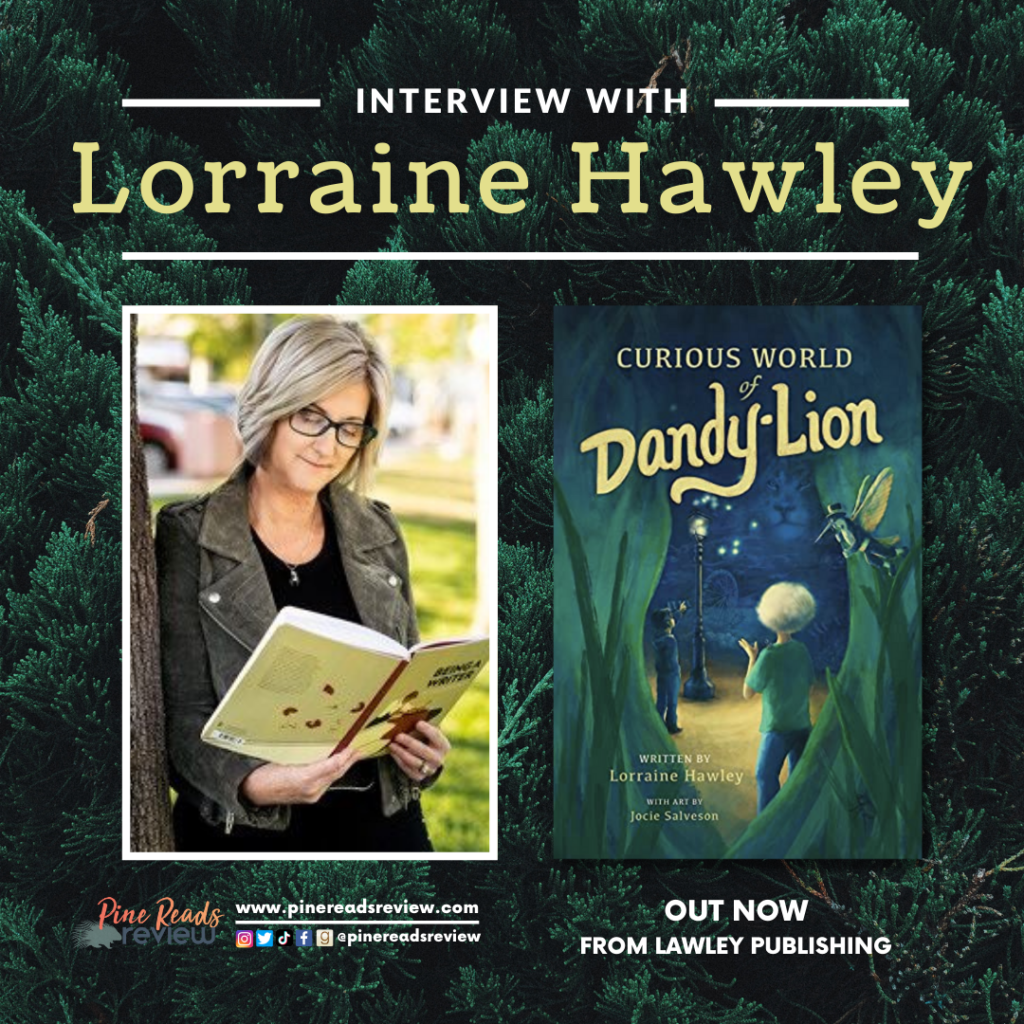
About the author: “I write stories about tweens, teens, and fantastical worlds. While I have attempted to write non-magical stories, my characters have refused to stay reality grounded, leaping off the pages to fly. So I gave up trying to be what I am not. I am a fantasy writer. And I hope to share magic with the world” (Bio taken from author’s website. Extended bio can be found on author’s website).
Find Lorraine on the following platforms:
Lorraine Hawley (LH): Writing for young readers is magical. Children are curious and willing to forgo the impossible in hopes of the possible.
I write for children in hopes my book touches even one reader. Books provide private gateways for kids to explore issues they may be too uncomfortable to ask. No one wants to admit they struggle, let’s say, to make friends or with sadness. They may even withhold that information from their parents. But parents or teachers do see their struggles and can slide in a book to help them not feel so alone.
LH: My main focus for Meredith was to tap into her sensitivities, feel her angst, and see her fantastical world. Meredith has a lot going on around her, affecting how she engages in the world. She is motivated to help her widow neighbor, but how to reach her goal is, well, out of reach. Until she discovers her value and the role she plays in other people’s lives.
Middle-grade readers are prime for books on kindness and compassion. In growth, kids learn to embrace their importance in a community and understand how their actions affect those around them.
I write my stories intending the readers to be fully aware my secondary characters have lives and problems, though I only keep a side-eye on them through the main character’s perspective. Some readers identify more with one of the other characters’ struggles; this is great because we take what we need from stories.
LH: The inspiration is based loosely on events from my early life. I was a painfully shy child. Like many kids, I had no idea where I fit in, and much like my main character Meredith, I struggled with sensitivity, primarily noises and bright light. There were times (still are times) I felt so overwhelmed, dealing with overstimulation issues, that I struggled to concentrate. I often found it easier to daydream than cope in the real world.
LH: Kids often feel unseen. Adults, in good conscience, may think it helpful to disregard a child’s imagination. The decision is possibly due to fears of a more complex situation, or perhaps they worry about a stigma with their child’s peers.
Children use make-believe to help cope and explore their dreams. Imaginative children grow up to become innovators, architects, actors, creators, and authors. Make-believe is all around us, and sometimes we forget that. Sing-along, dressing up, building forts, creative writing, and even video games are all imaginative play. Allowing for creative outlets provides growth.
I understand that some behaviors can cause concern for parents, and it is significantly more complex when imaginary friends go from cute to concerning at middle-grade age. But children mature at their own rate, and while some of their peers may have moved past make-believe, at least in public, many still have creative outlets. Speaking with a child specialist can help ease that concern if there is one.
Make-believe is common in adults, too, but in the form of daydreaming. Ever made a plan for the lottery you haven’t won? What about a dream job or planning a vacation there is no plan to take? Our imagination is necessary, and it has a time and place.
LH: Mr. Dally tugs at my heart. Grief is a complicated emotion for kids to understand. To Meredith, she would believe her old friend was jinxed instead of grieving and depressed. How would she know? Mr. Dally is not behaving normally, and he looks broken and sad. The exact way a person would look if some bully had jinxed them. What is also unfortunate is that Billy, her bully, believes himself so bad that he could have jinxed someone, even by accident.
We live longer and sometimes alone. Grandparent bonds have been challenging as of late, while some families live multi-generational. These bonds are important. In Curious World of Dandy-Lion, I wish to build empathy and offer kids tips for bonding comfortably, not only with the elderly but perhaps with someone lonely or grieving.
LH: I fell in love with escapism in books at that same early age. More specifically, stories that suggested there might be another world out there (preferably with a touch of magic) just out of reach, with characters who made me believe I was not alone in my oddities. I hid in books and traveled worlds in books, and no one questioned my lack of response.
Betty Brock perhaps wrote one of the most impactful books on my writing, a book called NO FLYING IN THE HOUSE. Escapism gave me hope and kept me dreaming. Though I swear, I could fly after reading that book and may have even hopped off a bed or two to find out.
LH: My next middle-grade project is high fantasy—a coming-of-age adventure with out-of-this-world zodiac characters. If you like found-family themes, my new book may be for you. You can follow its progress along with other upcoming books on my website. Thank you for asking!
And thank you for sharing kid’s literature with children and families. I am grateful for your tremendous effort.
PRR Writer, Sophie Applin
Comments are closed.
Thank you for the opportunity to speak with your readers!